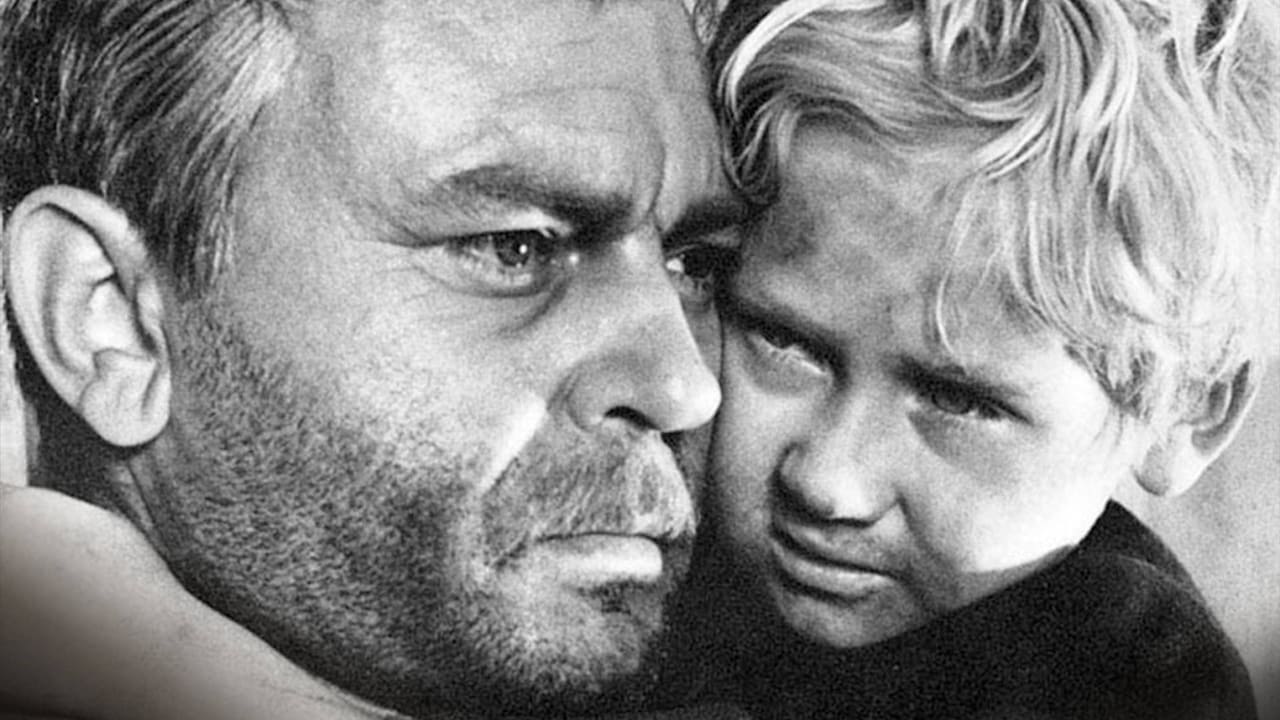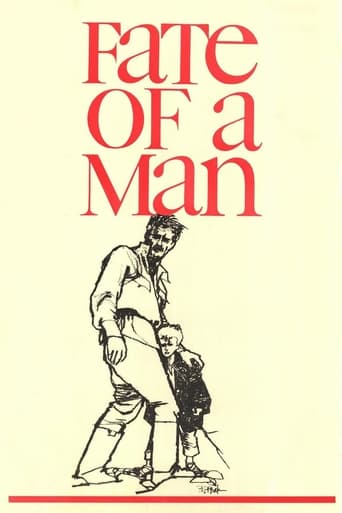

Buried under the mountain of clichés that typically entail a war film (although perhaps not so pronounced for the era), Fate of a Man is a genuinely emotional, well crafted movie that deftly handles the subjects of loss and resolve. What differentiates Bondarchuk's film from the litany of uninspired works, from any nationality, is the prowess with which he employs said mountain of clichés not just as a device to prop the plot upon, but instead as a means to explore the depths of the human trauma that results from war.Under the relative creative freedom the "Thaw" provided, Bondarchuk's work is highly subjective and seemingly draws influence from Italian neorealism. Sokolov is a man who lived contentedly, before the war took everything from him. The story is divulged from his first person account, intimately executed through voice over. Each shot is visual progression in his emotional journey. The neorealist value of characters' space and their movement through it realizes this sense of progression. To cite an example, we simply have to look at buildings and characters' relation to them. Solokov meets his wife constructing a home. Prewar life is warmly attached to these buildings (homes and factories), a sense of fulfillment and love residing within. Returning home after the war we see shots of lumbering skeletons of bombed out factories, everyday life stripped of the flesh that once gave it meaning. This sequence culminates in Sokolov's discovery of the crater where his family home once was. Attention to small details such as a bed frame sticking out of the puddle of water in the crater make it especially heart wrenching. Speaking more specifically about physically inhabiting a space, there are a couple of striking shots. One example is in the scene where the Nazi's call out men from a line for execution. After the doctor who helps Sokolov is removed from his place in the line, the camera lingers on the empty space where he once was for several seconds. It's small moments like these that make the audience really internalize the sense of loss rather than just sigh a quick mandatory, "Awww." There are moments in the film where the melodrama reaches distasteful limits, along with some poorly conceptualized and executed editing (ex. Water on the lens to fade in and out of early flashbacks). However, Fate of a Man is a special film, improperly served in this brief review.
... View Morea Sholokhov adaptation. powerful and honest. a Bondarchuk gem. and map of a war. it is a great Soviet film. not only as artistic work or testimony about elements of a period. not as sign of post Stalin evolution of art. but for silence of images. for the message after decades to its viewer. because the fate of man is, in fact, the fate of East Europe in last period of XX century. sufferance, pain and death. and delicate hope as freedom space. love as only gun against cruelty of a time. camps as metaphor for Nazi and Soviet system. fear, struggle for survive, guilty because innocence is only fiction. and sense of life, again and again, as fruit of battle against yourself. a film about life. pure life. without exception or pink ingredients. cold, bitter, strange but beautiful. if you discover force to remain yourself in middle of each storm.
... View MoreDestiny of a Man is an extremely genuine exploration of a Russian soldier's experience during the "Great Patriotic War," that strips him of everything he loves. Director Sergei Bondarchuk portrays a character whose struggles, sadness, and heroism feel astonishingly real. His acting brings audiences through a series of scenarios that demonstrate the pain and suffering caused by the conflict at home and on the front.The film is a continuation of the departure in the late 1950s from the Stalin Era's socialist realism into the postwar period of actual realism, in which characters act based on believable motives whether or not they follow the party line. Sokolov survives innumerable atrocities, bravely facing his Nazi tormentors, not for Mother Russia, but for the love of his family. In fact, the state plays very little role in the film at all, and it is very much the story of its protagonist, a story that is emotionally relevant in a very universal way.The film is honest and humble, but proceeds with a powerful style that underscores its raw humanity. It is marked by a motif of elevation, with Sokolov's emotions manifested in the highs and lows of shots and locations throughout his ordeal. He meets his wife while building a house, standing high above the ground. In scenes of suffering, including one in which he must lie on the ground in a Nazi detention camp, he is low to the ground, looking up at the imagined members of the family he so wishes to see. Likewise he ascends through his village to be reunited with his family, he reaches the depths of despair as he descends into the crater where his house stood. In the end, the message is a positive one. Much like Veronika in the earlier film The Cranes are Flying, Sokolov begins to rebuild his life around an adopted son who has also lost everything in the war. Troubles continue to plague the man and his country, but he is not alone, a simple message that matches the humanity woven throughout the film.
... View MoreI've seen a few Russian war films recently and noticed that they feel more like Hollywood war films . Both THE STAR and 9TH COMPANY suffer from this . COME AND SEE didn't . It was a brutal , unforgettable war film made during the late communist era of the Soviet Union showing the bestial atrocities forced upon the Soviet people . I did have high hopes that being a Soviet film rather than a Russian one DESTINY OF A MAN would show the suffering the Soviets endured from 1941-45 . Does it ? Yes to a degree but there's some faults in the story telling The story is told in flashback by Andrey Sokolov . He is taking his son for a walk in the countryside and meets a man and tells him of his wartime service . Conscripted in to the army as a driver he is captured by the Germans early in the war . He suffers deprivation as he's used as slave labour , sees comrades murdered by the Nazis , comes close death several times . Escapes and makes it back to his own lines where he's treated as a hero . He finds his wife and daughter died during an air raid and as the last days of the war take place his last child , a Red Army officer is killed in the Battle Of Berlin . Devastated Sokolov finds some comfort when he finds an orphan and adopts him as his son It's not a film that has a strong central plot . It is rather episodic but where it succeeds is showing the brutality of the Nazi regime against conquered people . Caputured officers , political commissars and Jews were shot out of hand and as Sokolov finds himself behind Nazi lines there's a scene where people go in to a camp with a large chimney bellowing smoke . The implication is stark and obvious - you enter via the front gate and leave via the chimney Ironically by drawing attention to the murderous intent of Nazism it leaves some plot holes involving Sokolov . He escapes from a forced labour detail and hides in the countryside for four days and is then recaptured . But would the Nazis allow an escaped prisoner to live ? Lkewise a brutal SS camp commander says he's going to execute Sokolov but then changes his mind because Sokolov can hold his drink There's another unlikelihood and that is when Sokolov escapes to the Soviet front lines kidnapping a German officer with important documents and being lauded as a hero , but would this have happened in real life ? It's a forgotten point of history that Soviet prisoners captured during the war would receive little sympathy from their leaders after being liberated . Many of them would be sent on a death march to Soviet gulags . It's disappointing that this aspect is never referred to , especially since Soviet leader Nikita Khrushchev instigated a de-Stalination program in the late 1950s at the time this film was made That said it's very much a humanist type of film showing the triumph of the human will in the face of great adversity and all these type of films suffer from the same flaw . The Japanese film trilogy THE HUMAN CONDITION is similar in some ways . But DESTINY OF A MAN doesn't suffer from the sugary artificial aspects of Hollywood and for that we should be thankful
... View More